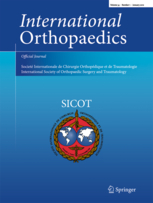
ARTHROPLASTY
PRP is effective in improving blood loss, pain and early functional outcomes following TKA
Int Orthop. 2014 Feb;38(2):387-95. doi: 10.1007/s00264-013-2136-6. Epub 2013 Oct 11.40 patients with knee arthritis (59 knees) undergoing either unilateral or bilateral total knee arthroplasty (TKA) were randomized to either receive or not receive an intraoperative injection of autologous platelet gel (APG). The purpose was to determine the effects of platelet-rich plasma (PRP) with respect to postoperative haemoglobin loss, pain and functional outcomes. Results indicated that the administration of PRP was associated with significantly superior haemoglobin levels, pain levels, and the requirement for narcotics in the postoperative period. These improvements led to better functional outcome up to 3 months postoperatively; however, at 6 months, this statistical significance was lost, and functional scores were similar between groups. Furthermore, there was no significant difference in wound healing between groups.
Unlock the full ACE Report
You have access to {0} free articles per month.Click below to unlock and view this {1}
Unlock NowCritical appraisals of the latest, high-impact randomized controlled trials and systematic reviews in orthopaedics
Access to OrthoEvidence podcast content, including collaborations with the Journal of Bone and Joint Surgery, interviews with internationally recognized surgeons, and roundtable discussions on orthopaedic news and topics
Subscription to The Pulse, a twice-weekly evidence-based newsletter designed to help you make better clinical decisions
Exclusive access to original content articles, including in-house systematic reviews, and articles on health research methods and hot orthopaedic topics
Or upgrade today and gain access to all OrthoEvidence content for just $1.99 per week.
Already have an account? Log in


Subscribe to "The Pulse"
Evidence-Based Orthopaedics direct to your inbox.
{0} of {1} free articles
Become an OrthoEvidence Premium Member. Expand your perspective with high-quality evidence.
Upgrade Now












































































